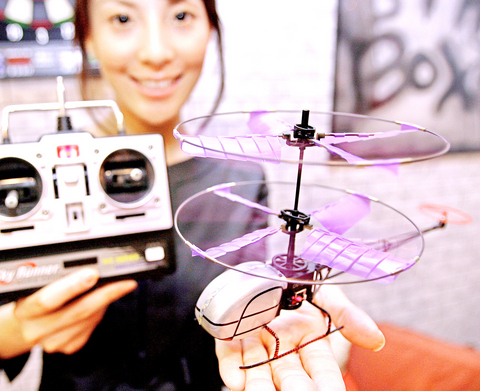A life-like, moving head of a chimp would hardly seem like a hot-selling toy, but in graying Japan, the Apeman is proving a hit for the new key market of "kidults."
The Apeman, which utters simian bellows and has precisely constructed hair and facial features, proved a magnetic draw at the 2006 International Tokyo Toy Show which closed this weekend.
"This should make a nice decoration for a house, at the entrance, perhaps," a promoter from major toymaker Bandai said of the Apeman, which costs ¥28,000 (US$250) and uses motion and sound sensors.

PHOTO: AFP
With a growing elderly population and a falling birthrate, Japan's toymakers are eagerly going after 30-and-40-somethings who have money and want toys to satisfy their youthful fantasies.
More than 35,000 toys were showcased at the biggest toy trade show in Japan, birthplace of global sensations such as Pokemon and Power Rangers.
Certainly, many of the 166 firms at the show offered toys for kids -- stuffed animals, Disney characters, building blocks, miniature cars, action hero figures, board games and tools for magic tricks.
But the size of the Japanese toy market has fallen from ¥731.8 billion in 2000 to ¥697.5 billion last year as the industry faces both a shrinking population and changing consumer tastes, according to the Japan Toy Association, which organized the trade fair.
While continuing to market to children, the industry must cater to the "kidult," the association said.
Among notable examples, toy firm Tomy is luring men with radio-controlled model air planes as well as mini cars that can be operated remotely via mobile phones.
The planes go for ¥2,625 a piece, while the cars are priced at ¥980.
"These are types of things that many men might have wanted as children, but not necessarily owned them as children because they used to be expensive. We were able to keep the prices low so that men with children can still buy these and play with their children," Tomy spokeswoman Akane Asanuma said.
For other older customers, the company offers a small potter's wheel, a digital marriage counseling toy and baby-like "partner" dolls that sing and talk to comfort adults with no children.
Toy firms must take a "two generation approach" to attract both children and their parents, said Kasumi Nakanishi, spokeswoman for toymaking giant Bandai.
Bandai, known for action hero figures such as the Power Rangers, has successfully captured adult men with upgraded action hero gadgets, including ¥30,000 adult-size reproductions of a belt worn on the star of the 1970s megahit Kamen Rider television series.
"Men in their 30s or 40s, they grew up in the 1970s, when the average household had several children. This meant they had to wait for Christmas or birthdays to receive toys that they wanted," Nakanishi said. "Now, they have money to buy the toys, especially single men."
While children are the still the main market, there is big money in adult toys, he said.

CHIP WAR: The new restrictions are expected to cut off China’s access to Taiwan’s technologies, materials and equipment essential to building AI semiconductors Taiwan has blacklisted Huawei Technologies Co (華為) and Semiconductor Manufacturing International Corp (SMIC, 中芯), dealing another major blow to the two companies spearheading China’s efforts to develop cutting-edge artificial intelligence (AI) chip technologies. The Ministry of Economic Affairs’ International Trade Administration has included Huawei, SMIC and several of their subsidiaries in an update of its so-called strategic high-tech commodities entity list, the latest version on its Web site showed on Saturday. It did not publicly announce the change. Other entities on the list include organizations such as the Taliban and al-Qaeda, as well as companies in China, Iran and elsewhere. Local companies need

CRITICISM: It is generally accepted that the Straits Forum is a CCP ‘united front’ platform, and anyone attending should maintain Taiwan’s dignity, the council said The Mainland Affairs Council (MAC) yesterday said it deeply regrets that former president Ma Ying-jeou (馬英九) echoed the Chinese Communist Party’s (CCP) “one China” principle and “united front” tactics by telling the Straits Forum that Taiwanese yearn for both sides of the Taiwan Strait to move toward “peace” and “integration.” The 17th annual Straits Forum yesterday opened in Xiamen, China, and while the Chinese Nationalist Party’s (KMT) local government heads were absent for the first time in 17 years, Ma attended the forum as “former KMT chairperson” and met with Chinese People’s Political Consultative Conference Chairman Wang Huning (王滬寧). Wang

CROSS-STRAIT: The MAC said it barred the Chinese officials from attending an event, because they failed to provide guarantees that Taiwan would be treated with respect The Mainland Affairs Council (MAC) on Friday night defended its decision to bar Chinese officials and tourism representatives from attending a tourism event in Taipei next month, citing the unsafe conditions for Taiwanese in China. The Taipei International Summer Travel Expo, organized by the Taiwan Tourism Exchange Association, is to run from July 18 to 21. China’s Taiwan Affairs Office spokeswoman Zhu Fenglian (朱鳳蓮) on Friday said that representatives from China’s travel industry were excluded from the expo. The Democratic Progressive Party government is obstructing cross-strait tourism exchange in a vain attempt to ignore the mainstream support for peaceful development

ELITE UNIT: President William Lai yesterday praised the National Police Agency’s Special Operations Group after watching it go through assault training and hostage rescue drills The US Navy regularly conducts global war games to develop deterrence strategies against a potential Chinese invasion of Taiwan, aimed at making the nation “a very difficult target to take,” US Acting Chief of Naval Operations James Kilby said on Wednesday. Testifying before the US House of Representatives Armed Services Committee, Kilby said the navy has studied the issue extensively, including routine simulations at the Naval War College. The navy is focused on five key areas: long-range strike capabilities; countering China’s command, control, communications, computers, cyber, intelligence, surveillance, reconnaissance and targeting; terminal ship defense; contested logistics; and nontraditional maritime denial tactics, Kilby